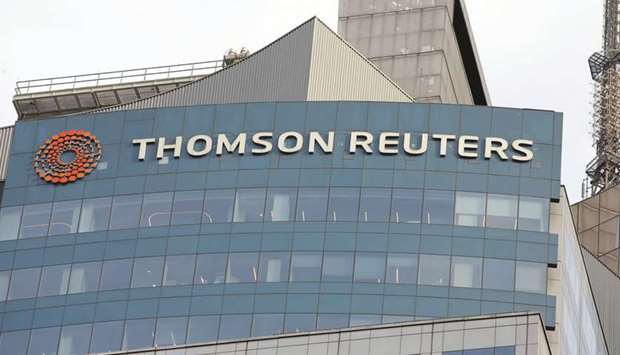A consortium led by Blackstone is putting together $13.5bn of bond and loan financing this month to buy a majority stake in Thomson Reuters Corp’s financial terminal business. They’re the largest junk debt offerings of the year, and to sell them, the private equity firm is touting the cost savings it can wring from the unit, which will leave it with more cash to pay interest, the people said.
Without those savings, a measure of the company’s income, known as earnings before interest, taxes, depreciation and amortisation, was around $1.88bn for the twelve months ended June 30. With the savings, that figure would be around $2.53bn, according to the people, who asked not to be identified because they weren’t authorised to speak publicly about the matter.
In today’s frothy credit markets, the Thomson Reuters unit is hardly alone in boosting a measure of its earnings as it tries to sell debt.
Its 35% adjustment is high by historical standards – in the beginning of 2015, the typical change for an acquisition was around 10%, according to data from research firm Covenant Review.
The changes make a big difference in the potential riskiness of the deals, by at least one metric.
Using the company’s expectations, it will have debt equal to about 5.4 times Ebitda, below the six-times level that had raised regulators’ eyebrows starting in 2013. Without expected cost savings, debt will be equal to 7.3 times Ebitda. And using an estimate from S&P Global Ratings, indebtedness spikes to more than ten times that earnings figure.
At the heart of the different figures is the question of how much companies’ earnings can be adjusted when investors consider how much to lend. Corps often use adjusted Ebitda figures in tests that determine whether they are healthy enough to continue borrowing.
Historically those tweaks factored out one-time events that might distort a metric of a company’s health, but over time the adjustments have grown more aggressive.
For acquisitions, Ebitda adjustments averaged closer to 35% in the second quarter of this year, according to Covenant Review.
Representatives for Blackstone and Thomson Reuters declined to comment. Bloomberg LP, parent company of Bloomberg News, competes with Thomson Reuters and the division that is being partially sold in providing news, data and analytics for Wall Street traders.
S&P said in a report that adjusted Ebitda will rise to more than 10 times at the close of the acquisition, before falling to around 9.6 times by the end of next year and 7.8 times in 2020, as operating and restructuring costs decline.
Investors led by Blackstone agreed in January to buy a 55% stake in the Thomson Reuters’s financial-and-risk division. The business, to be renamed Refinitiv once the acquisition is complete, is marketing loans and notes in both the US and Europe to fund the deal.
The smaller portion will be high-yield bonds – $3.8bn in dollars and the equivalent of $1.7bn in euros, according to the people with knowledge.
Bankers are holding meetings to market the debt to investors; commitments for the loans are due by September 17, and the bonds are expected to price the following day, the people said. JPMorgan Chase & Co is the lead manager on the bond sales, while Bank of America Corp is leading the loan offerings, the people said.
Representatives from JPMorgan and Bank of America declined to comment.

